Finding new ways to give your plants a boost of nutrients can sometimes be tricky. Are you growing marigolds in your garden and want to try using coffee grounds or eggshells on them? Do marigolds prefer one over the other?
Luckily, we've done some research and have the answer below! Let's check it out.
Using coffee grounds, eggshells, or both can benefit marigolds. Typically, using coffee grounds and eggshells for marigolds will give them a boost of nitrogen and calcium, which can help them grow better.
Furthermore, eggshells can prevent slugs from damaging marigolds, while coffee grounds can also ward off critters and keep your flowers healthy and undamaged.
As we dive into this topic, we will cover all things marigolds and discuss whether using eggshells and coffee grounds for them is a good idea. If you're new to this flowering species, have extra eggshells or coffee grounds leftover, or need additional assistance, we're here to help. With that said, let's begin!
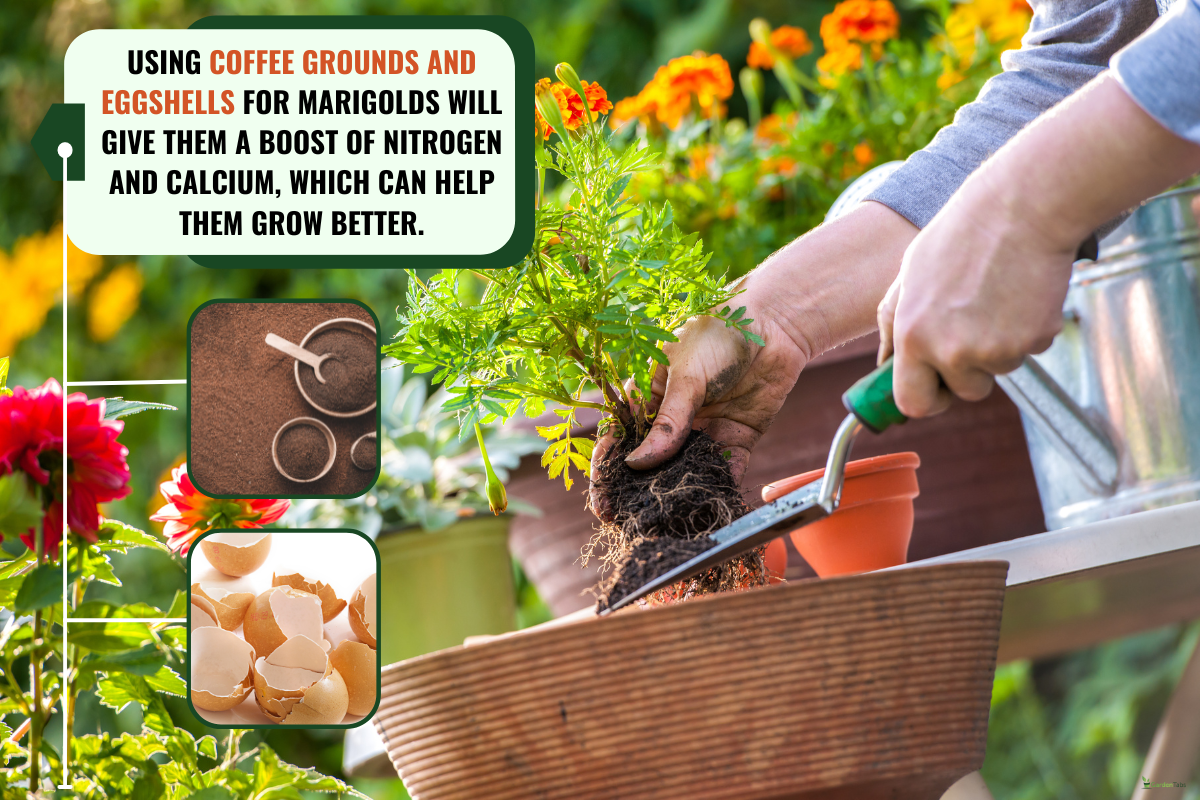
Should You Put Eggshells And Coffee Grounds On Marigolds?
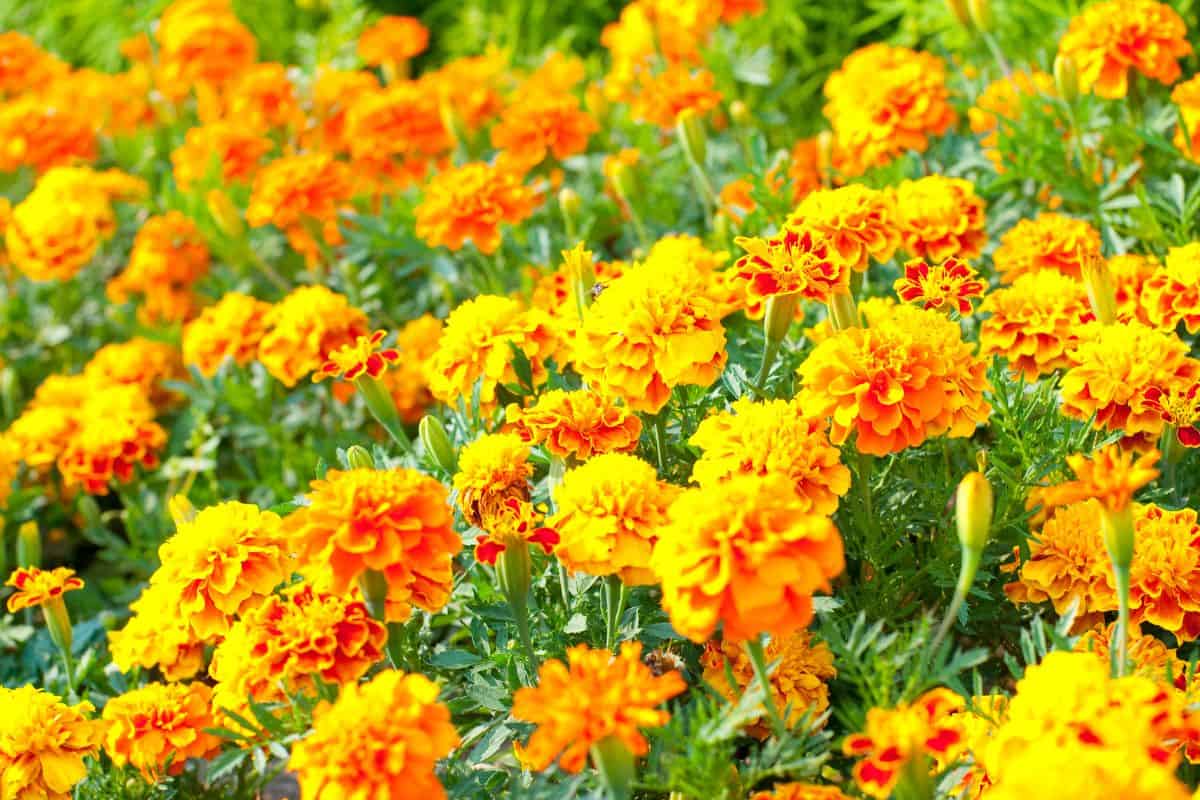
Yes! Using some extra coffee grounds and eggshells around your marigold can benefit it. As we said, coffee grounds supply nitrogen to marigolds and ward off unwanted bugs.
Eggshells give your marigold a boost of calcium while also warding off slugs that can eat and damage marigold plants. So, using the two together can be a double punch of protection and nutrients.
Many experts claim that these additional nutrients can encourage a marigold to grow faster and produce larger blooms. Therefore, combining the two and sprinkling them around the base of your flower may be a great idea.
CBS Chicago also mentions the importance of supplying a flower bed with calcium and nitrogen, thus encouraging gardeners to use eggshells and coffee grounds at home.
So, overall, we would agree that trying this has many benefits for marigolds/flowers in general.
Using Eggshells On Marigolds
Applying eggshells to the soil around a marigold can benefit your plant greatly. Most importantly, eggshells around a marigold will help protect it from snails and slugs.
In general, these critters can cause damage to marigolds, often eating their foliage. On top of that, placing eggshells around a marigold can help add calcium to the plant, which is a great way to boost its energy.
Similar to humans needing calcium for bone growth and health, your marigold can also use it for development. Although your marigold doesn't have bones, its stems and leaves can always use an extra boost of calcium.
Using Coffee Grounds On Marigolds
One of the main benefits of using coffee grounds on marigolds is their nitrogen content. As we said, coffee grounds essentially work as a slow-release nitrogen fertilizer for marigolds.
Therefore, your flower won't get too much nitrogen all at once, so it won't be shocked. Additionally, coffee grounds ward off slugs and other garden creatures, as they have an unpleasant smell to certain species.
According to HGTV, coffee grounds contain high levels of nitrogen, which can help encourage the ground around your marigold to be more fertile.
That said, the more fertile and healthy your plant's ground, the better it will grow and flower.
Which Is Better For Marigolds: Coffee Or Eggshells?
When it comes to which additive is "better" for marigolds, that depends on what your garden needs. Since eggshells don't offer nitrogen and coffee grounds don't add calcium to the ground, these two ingredients have their own set of pros.
In addition, both eggshells and coffee grounds can ward off slugs, making them an excellent choice for marigold protection. Generally, gardeners use coffee grounds more than eggshells: but that's not to say they're better.
Coffee grounds might be easier to gather and spread around your marigolds, but that doesn't make them the better choice.
If anything, we recommend combining the two ingredients and spreading them evenly around your marigold. Why settle for only nitrogen or only calcium when you could have both?
If you have a compost bin or pile, you may also want to throw in coffee grounds and eggshells and use that mixture on your marigolds, so there are plenty of ideas here.
How Often Should You Apply Coffee Grounds To Marigolds?
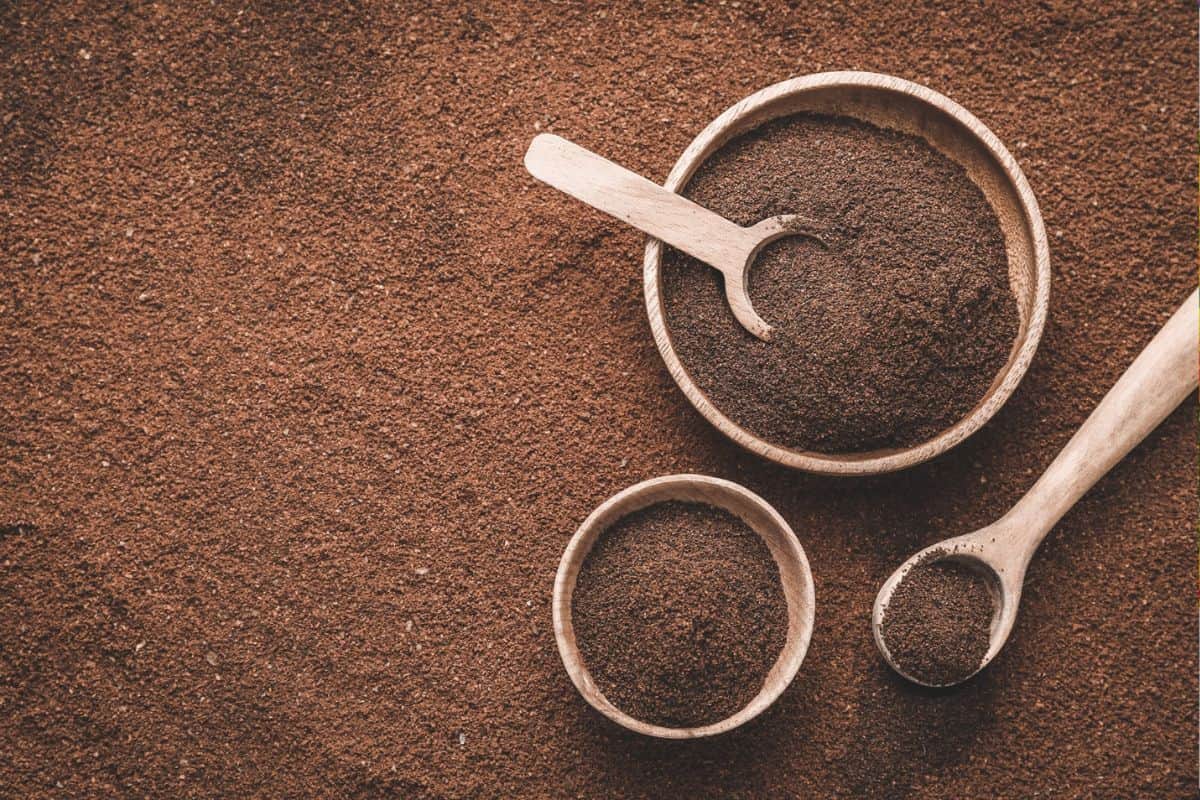
In general, you're safe to add coffee grounds to marigolds every 1-2 weeks. Because coffee grounds can be acidic, you don't want to overuse them in a flower bed.
Even though the nitrogen from coffee grounds can benefit marigolds, using an excess amount can send your plant's roots into overload. This is the same with overfertilizing, so imagine the two as similar applications.
According to compost experts, if you add coffee grounds to your mix: do this once per week MAX. Too much acidity in your compost pile can also cause trouble for its efficiency, so less is more.
How Often Should You Apply Eggshells To Marigolds?
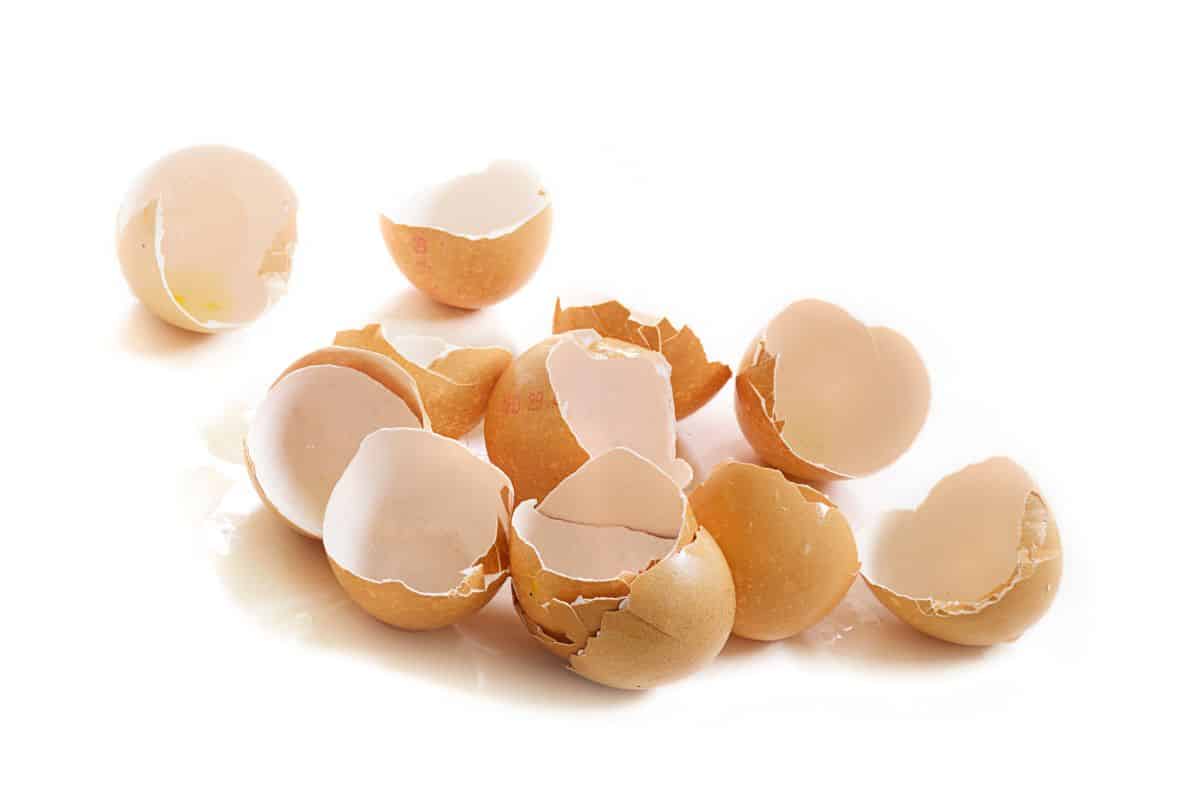
Like coffee grounds, you can also wait to apply eggshells to a marigold every couple of weeks. Generally, eggshells won't decompose as quickly as coffee grounds, meaning you don't need to use them as often.
In addition, if you use eggshell powder for fertilizer, this only needs to happen once or twice annually. Although beneficial to marigolds, calcium can also become too overpowering in excess.
Therefore, try and do this once per month during your marigolds' growing season, which should encourage new, strong growth while keeping your flowers healthy.
Remember, too much of a good thing doesn't always end nicely.
What Is The Best Fertilizer For Marigolds?
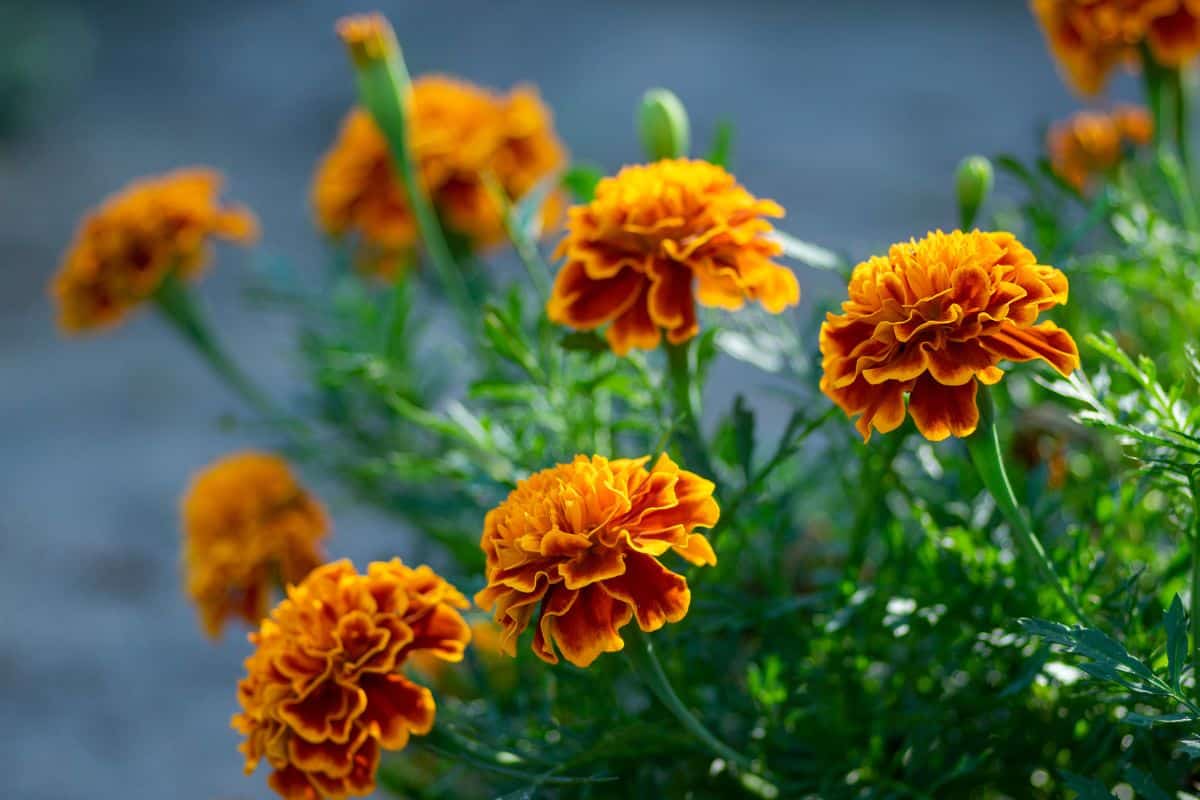
For anyone needing fertilizer for their marigold, stick with a complete fertilizer with a nitrogen count of 100 to 150 parts per million. Additionally, you want a balance of nitrogen and potassium, such as a 15-15-15.
As we said above, marigolds love nitrogen. Therefore, finding a fertilizer with enough percentage of it can mean stronger growth and better blooming.
Many experts also warn against using fertilizers with ammonium for marigolds if the weather is under 65 degrees, so that's one precaution.
Moreover, marigolds don't usually need fertilizer in colder seasons, as they won't be actively growing. So, keep your fertilizer well-balanced, and only apply it during nice conditions.
On the other hand, you might prefer an all-natural compost route for your fertilizer: which is also very beneficial to marigolds. Remember, adding eggshells and coffee grounds to your compost is always good!
When Should You Apply Fertilizer To Marigolds?
The best time of year to feed marigolds with compost or fertilizer is during the spring. Since your flowers will grow their best this season, giving them a boost can't hurt.
Many pros suggest fertilizing marigolds a few times throughout the spring if the soil needs more fertility. Of course, adding coffee grounds or eggshells instead could also fill your marigold's void, but that's your decision.
Furthermore, you might prefer to give your marigolds a slow-release granular formula instead of a fast-acting liquid option. Sometimes, less fertilizer all at once can be healthier for your flower.
Another benefit of giving marigolds slow-release fertilizer is you only need to do this once or twice for the entire season. So, from a time-saving standpoint, granular feeding may be better.
With that said, if your marigold is underperforming throughout the spring or summer, adding fertilizer can be an easy way to see things improve.
Osmocote Smart-Release Plant Food
This slow-release fertilizer features 11 essential nutrients, has a granular formula, works for flowers, feeds up to six months per application, won't burn roots, and comes in an eight-pound bag.
View this fertilizer on Amazon.
Is Miracle-Gro Good For Marigolds?
When fertilizing marigolds, you might notice Miracle-Gro pop up everywhere. This plant food line is one of the more popular choices on the market, but is it safe for marigolds?
Generally, they'll work well if you use a slow-release or water-soluble Miracle-Gro product for flowering plants like marigolds.
According to the brand's website, you want to try 'Miracle-Gro® Water Soluble Bloom Booster® Flower Food' for marigolds, as its formula is curated for them and other common flowers.
Furthermore, slow-release plant foods from this company should also be fine for marigolds as long as they target flowers. Again, Miracle-Gro does contain chemicals (that's what makes it work so quickly), so if you want an all-natural option: steer clear.
Miracle-Gro Water Soluble Bloom Booster Flower Food
This fertilizer works for marigolds, encourages better blooms and vibrant color, feeds every two weeks, instantly feeds flowers, and comes in a four-pound container.
Check out this fertilizer on Amazon.
Is Compost Good For Marigolds?
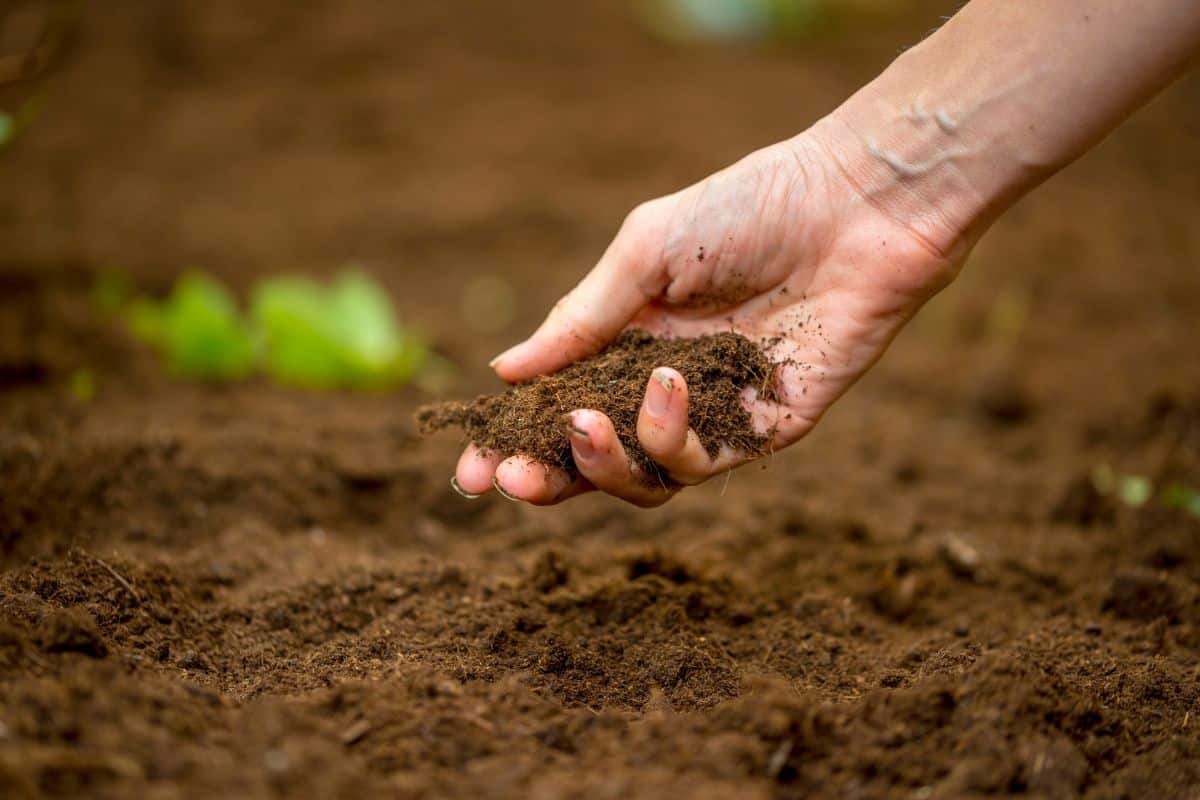
Yes! As long as your compost mix is high-quality, it should greatly benefit marigolds. Typically, the nutrients and various ingredients in compost can promote better soil health in your yard.
Not only will more fertile ground help your marigold grow better, but it can also be used instead of a chemical fertilizing product.
According to Planet Natural, the best compost for marigolds will contain generous amounts of organic compost or well-aged manure.
Furthermore, they recommend adding compost before planting marigolds so your flower goes right into nutrient-rich conditions.
Of course, you can always add eggshells and coffee grounds to this mix, especially if you want your flowers to be slug-free and grow healthy.
To Finish
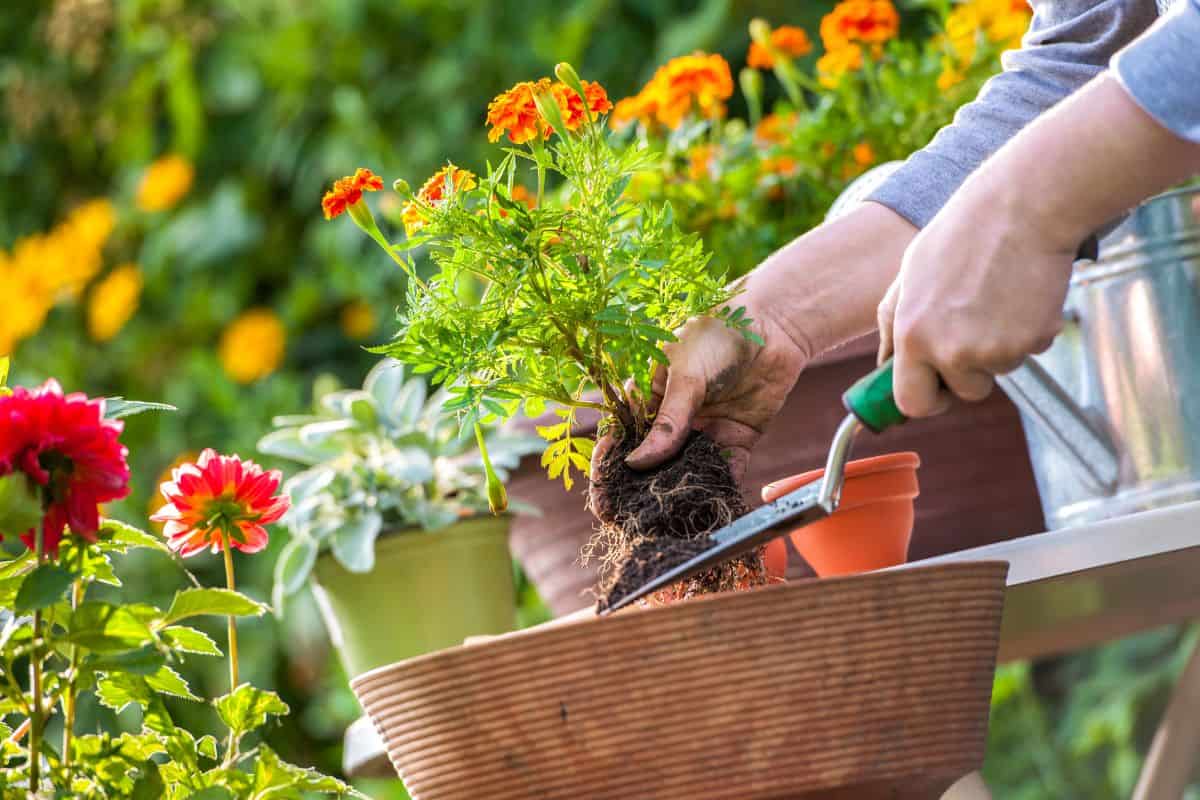
Whether you have marigolds in your landscape or want to plant them, it's always good to know what ingredients to add to their soil. We found that eggshells and coffee grounds benefit marigolds, giving them calcium and nitrogen.
Between the two, you may notice gardeners using coffee grounds more often: but that's not to say one is better than the other. It's also worth mentioning that eggshells and coffee grounds prevent slugs and snails from eating marigolds.
So, try and mix the two or add them to compost before sprinkling them onto your flower's soil!
While we have your attention, check out these related garden articles:
When To Plant Marigolds? [Inc. Seeds And Seedlings]
Which Marigolds Are Not Edible/Toxic? [Comprehensive Guide]
Are Marigolds Drought-Tolerant? [& Should They Be Watered Daily?]


